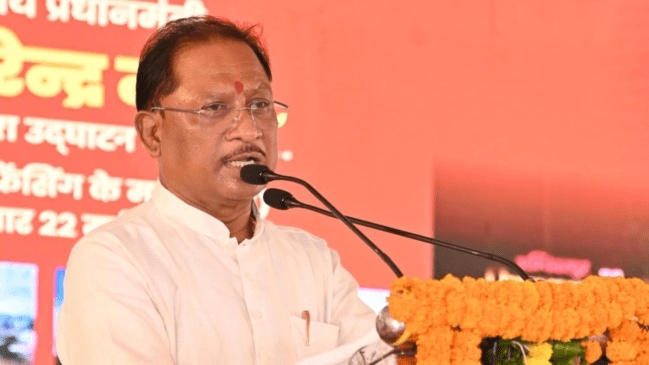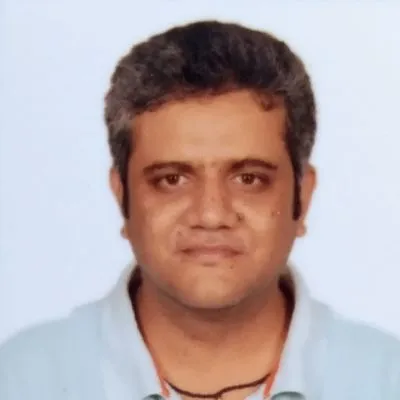Vishnu Deo Sai interview: ‘There is danger from Naxals in forests as well as urban Naxals… We are watching both’
“Our intelligence network is strong and they ascertain (the identity of Maoists)… Our forces never attack civilian areas. Not a single civilian was killed in the multiple (anti-Maoist) operations that were conducted,” says Chhattisgarh CM
 In Chhattisgarh, the CM Vishnu Deo Sai government has stepped up its anti-Naxal operations recently. (Facebook)
In Chhattisgarh, the CM Vishnu Deo Sai government has stepped up its anti-Naxal operations recently. (Facebook) Security forces have stepped up operations against Naxals in Chhattisgarh to keep up with the Centre’s deadline of eliminating the Left Wing Extremism (LWE) from the country by March 2026.
In an interview with The Indian Express, Chhattisgarh Chief Minister and BJP leader Vishnu Deo Sai speaks about the ongoing anti-Maoist operations, the “threat from urban Naxals”, and the past Congress governments’ alleged lack of resolve to root out the Naxal problem from the state, among other issues. Excerpts:
*What has prompted your government to take such a strong action against Maoists?
Maoism is the greatest threat to democracy. Maoists want to capture power through arms and do not believe in the Constitution. They constantly challenge the democratic set-up and have been killing tribals and security personnel. They are also against development. Hence, the eradication of Maoism is very important and the government is working towards it.
*Why do you think breakthroughs like the elimination of CPI (Maoist) general secretary Basavaraju along with 27 other Naxals were not seen under previous state governments led by the Congress or the BJP?
The BJP government of Raman Singh fought Maoism with resolve but the successive Congress government (of Bhupesh Baghel) lacked it. Since we returned to power in 2023, we have scaled up the fight.
The Union Home Minister (Amit Shah) has himself taken a resolve to uproot Maoism by March 31, 2026, and has visited the state many times to raise the morale of security forces.
Naxals tried to destroy the whole leadership of the (state) Congress (in the 2013 Sukma attack). About 28-29 Congress leaders were killed but it still did not take tough measures despite being in power for five years. This is sad.
*Some quarters have criticised your government’s policy against Maoists with the Left parties terming the recent encounter and Operation Kagar as “extra-judicial killings” while accusing the government of having no resolve to address the issue through dialogue…
This criticism has no factual basis. Maoists have constantly tried to stall development in tribal areas and have been killing security personnel. In such a situation, we have to fight them.
*How do you ensure that no innocent person is targeted? Are there checks and balances in place?
Our intelligence network is strong and they ascertain (the identity of Maoists). Maoists stay in the jungles and hills, which have very little inhabitation. When Maoists gather in such places, the intelligence set-up ascertains their presence. Our forces never attack civilian areas. Not a single civilian was killed in the multiple (anti-Maoist) operations that were conducted. We are careful about that.
*What do you think lies at the core of Maoism – poverty and oppression or ideological indoctrination?
The Naxals have brainwashed tribal youth and provoked them against the government while trying to mislead them.
However, the tribal youth now understand reality. The way we are opening security camps and taking welfare services to them, they have understood the value of development and are backing the government.
I can say this with confidence because 1.65 lakh people from the region registered for the recently held Bastar Olympics. Over 47,000 people took part in the Bastar Pandum festivities that the government organised.
*What do you think about the term ‘urban Naxal’ that your party often uses? Do they exist?
There is danger from Naxals in the forests as well as urban Naxals. Both have links. Urban Naxals help the actual Maoists cadre in the forest areas in every way. Our security forces keep a close watch even on urban Naxals.
*But who are urban Naxals?
They are supporters of Naxalism who also support them financially as well as provide bauddhik (intellectual) support.
*What is the path to development of tribal youth, particularly in Bastar? Are you for large-scale investments and mainstreaming or do you think tribals should maintain their pristine lifestyle?
Tribals are in large numbers in these regions. Bastar has a great tourism potential and we want to promote it. To bring economic benefits to the tribals, we are looking at value addition to various kinds of forest produce. We also want agricultural development here and want to take water to the fields.
We are also looking to promote animal husbandry and have entered into an agreement with the National Dairy Development Board (NDDB). We will give two cows to each family and the NDDB will help us in that. Apart from this, rearing of goats and fish is also being promoted.
*Can you throw some light on the Chhattisgarh District Reserve Guard (DRG)? How do central forces coordinate with them?
Local youth, who are acquainted with the geography and local language, have been recruited in the Chhattisgarh Police as DRG and have made a stellar contribution in the last operation. The DRG and central forces like CRPF, BSF and ITBP complement each other and work in tandem.






